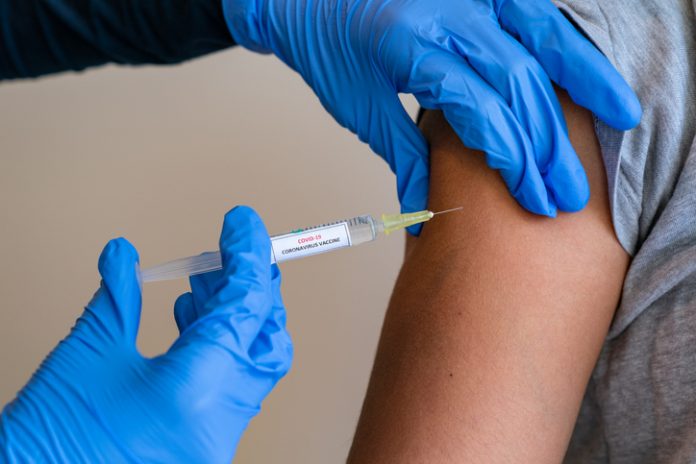A number of states have rejected the Centers for Disease Control and Prevention’s (CDC) recommendation to give COVID-19 shots to children.
The CDC recommended giving COVID-19 shots to children along with standard immunizations in October after the CDC’s Advisory Committee on Immunization Practices unanimously voted to add them to the vaccine schedule. Although the CDC recommendations aren’t binding, many states and schools use the CDC childhood immunization schedule to create their own vaccine requirements.
After the CDC’s announcement, Arizona, Arkansas, Florida, Indiana, Iowa, Mississippi, Montana, Oklahoma, South Carolina, West Virginia, and Wyoming stated they would not add COVID-19 shots to their government school vaccine schedules.
Currently, 21 states have a ban on COVID-19 vaccine mandates, according to the National Academy for State Health Policy.
States Cautious About Mandates
Policymakers in many states were cautious about instituting widespread mandates, says Joel Zinberg, M.D., J.D., a senior fellow at the Competitive Enterprise Institute and director of the Health and American Well-Being Initiative at the Paragon Health Institute.
“Throughout the pandemic, many states have been reluctant to mandate vaccines for anyone outside of medical care and other limited settings,” said Zinberg. “State and local authorities are undoubtedly cognizant of parental concerns over the limited benefit of the vaccines for healthy young people and the uncertain safety profile.”
The FDA distinguishes between its regular approval process and emergency use authorization (EUA), which means a shot is not approved but allowed because of a public health emergency. The Moderna and the Pfizer-BioNTech shots have received EUAs for six-month-old babies, teens, and adults.
State vaccine mandates have been limited to groups specified in the EUAs, says Zinberg.
“The few jurisdictions that have, or are discussing, mandates are only doing so for age groups that the FDA [Food and Drug Administration] has approved the vaccine for, not merely authorized it,” said Zinberg.
Children’s COVID Risk Low
Widespread vaccination of children is not medically indicated, says Zinberg.
“COVID is a relatively benign disease for healthy young people,” said Zinberg. “Outside of people who are immune-suppressed or have underlying medical problems, the risk of death from COVID for young people is negligible. In addition, the safety profile for kids is still not completely clear.”
Additionally, COVID-19 vaccines are not like the other vaccines required to attend government schools, says Zinberg.
“COVID vaccines are different than other vaccines since they do little to limit transmission of disease with the newer viral variants,” said Zinberg. “The primary benefit of COVID vaccines is in reducing disease severity.”
Vaccine Safety Concerns
Safety concerns are a key reason parents are saying no to shots for their young children, says Twila Brase, president of the Citizens’ Council for Health Freedom.
“Studies show children face more risks from the shot than from the virus,” said Brase. “COVID variants are less impacted by the shot, the shot’s effectiveness is waning, studies point to immune imprinting as a problem with effectiveness, and there’s never been research on the long-term effects.”
Severe side effects of the vaccines have been reported in children, says Jane Orient, M.D., executive director of the Association of American Physicians and Surgeons.
“The long-term effects on fertility, birth defects, and carcinogenesis cannot possibly be known,” said Orient. “Testing on children has been extremely limited. Serious safety signals, including death, are being ignored or denied.”
What States Should Do
Rather than mandating vaccines, informed consent should be the standard, says Zinberg.
“A rational policy for states regarding COVID vaccines and children is to make the vaccines available, disseminate safety and efficacy information as it becomes available, and to leave the decision-making up to parents,” said Zinberg. “Parents and their pediatricians have the most information on children’s underlying health conditions and whether they create increased risk of severe COVID disease for a particular child.”
Orient says every state should both refuse to mandate COVID-19 shots and prohibit them outright for children.
“Jabbing children with a product that is of no proven benefit to them and can kill them or cause grievous permanent harm is an outrageous violation of human rights and medical ethics. All states should be refusing to mandate these. The United States should follow the example of Denmark and prohibit them.”
‘Biosecurity State’
States should eliminate all vaccine mandates, not just mandates for COVID-19 vaccines, says Brase.
“Bodily autonomy is essential for individual freedom,” said Brase. “If the government can violate a person’s body at will, that person has no freedom, except at the pleasure of the state. There should be no vaccine mandates.”
Technology has made it possible for governments to push the limits on health rights, says Brase.
“Diseases have affected others since time began,” said Brase. “Only now, with expanded technologies, do the capabilities exist to suppress human rights en masse under the guise of protecting humanity. This kind of mandate leads inexorably to the end of freedom, the end of human and inalienable rights, and the imposition of a totalitarian biosecurity state.”
Harry Painter (harry@harrypainter.com) writes from Oklahoma.
Internet info:
“States Address School Vaccine Mandates and Mask Mandates,” The National Academy for State Health Policy, November 3, 2022: https://www.nashp.org/states-enact-policies-to-support-students-transition-back-to-school/





















